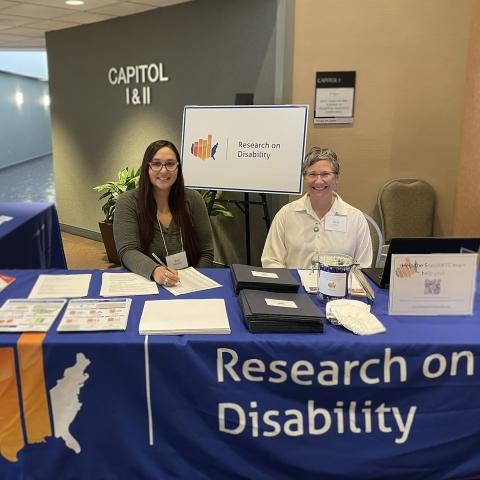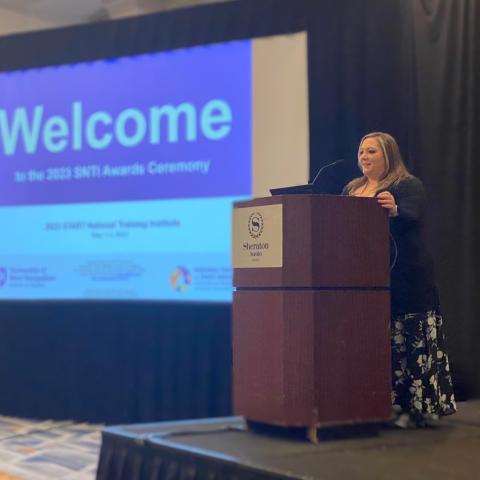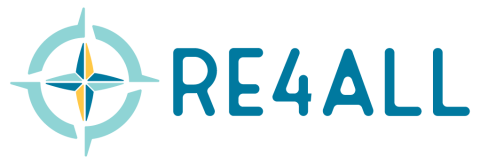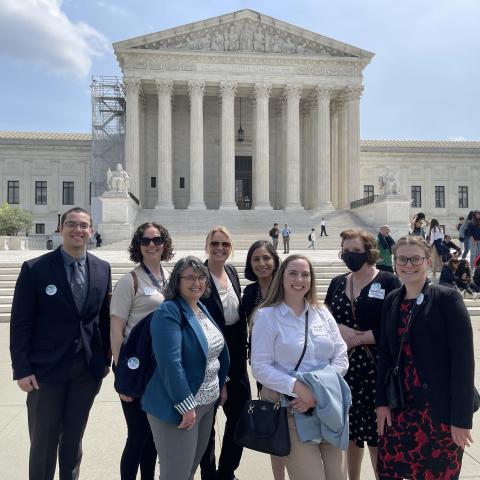NH-ME LEND Prepares Maternal and Child Health Leaders
Graduates of NH-ME LEND (2013, 2018, and 2021 cohorts) recently completed annual surveys – trainees are surveyed at two, five, and ten years post-training – to gather data on outcomes. Results showed that nearly all respondents recommend the program to others, and most actively apply the skills gained from the training in their professional work.
Additionally, more than four out of five graduates continue to work with individuals with disabilities. Given these outcomes, the NH-ME LEND program has demonstrated substantial progress in achieving its mission to not only prepare leaders to enter the field of maternal and child health, but to improve the lives of children with neurodevelopmental disabilities and their families.
Addressing Disparity through Advancements in Data Collection

Amy Chamberlain and Karen Volle at the 2022 Research on Disability State of the Science event in Washington, DC.
High quality disability statistics play an important role in efforts to address disparities between people with and without disabilities. UNH’s Center for Research on Disability works to gather and distill statistics into easy to access and understandable information that can be used to effect positive change in the lives of people with disabilities.
October of 2022 saw the culmination of four years of work generating this information as researchers met with partners and other experts in the field to present and discuss the latest data and advancements in the disability statistic science at their State of the Science on Disability Statistics Conference.
Topics varied from those at risk of workforce exit due to disability, innovations in survey design, updates from federal data collectors, and presentations of key findings. Special guest speakers included Michael Gamel-McCorkmick, Disability Policy Director for Senator Bob Casey; Anjali J. Forber-Pratt, PhD, Director of the National Institute on Disability, Independent Living and Rehabilitation Research (NIDILRR), and the IOD’s own director Kelly Nye-Lengerman, PhD.
Soon after that in February 2023, the Center for Research on Disability facilitated the 13th release of the Annual Disability Statistics Compendium, affectionately called the Compendium, a web-based tool that makes disability statistics easier to find and use. The Compendium gathers the most recent national statistics on people with disabilities from various federal programs and agencies and provides current statistics and time trends related to the prevalence of disabilities, as well as key indicators on employment, health, community living, and other outcomes of importance in monitoring the well-being of individuals with disabilities. All statistics can be found at DisabilityCompendium.org.
35th Anniversary of the START Model and the Return of In-Person Training Institute

Sara Stanton speaks at the first 2023 START National Training Institute since the start of COVID-19.
After three years of virtual delivery due to COVID-19, 2023 saw the return of in-person START National Training Institute (SNTI) gatherings, hosted by the National Center for START Services® (NCSS).
2023 also marked the 35th anniversary of the START model, which stands for Systemic, Therapeutic, Assessment, Resources, and Treatment. START is a national model that aims to improve the lives of people with intellectual/developmental disabilities and mental health needs and their families. Since the late 1980s and early 1990s, START has grown from the first program in Massachusetts to more than 30 states with START programs and other services, all facilitated by NCSS. Now, START even has an international presence with partnerships in Canada and the United Kingdom., which stands for Systemic, Therapeutic, Assessment, Resources, and Treatment, is a national model that aims to improve the lives of people with intellectual/developmental disabilities and mental health needs and their families. Since the late 1980s and early 1990s, START has grown from the first program in Massachusetts to more than 30 states with START programs and other services, all facilitated by NCSS. Now, START even has an international presence with partnerships in Canada and the United Kingdom.
225 mental health and medical professionals representing 26 U.S. states as well as Washington, D.C. and Quebec came together for this year's SNTI, where they learned about the newest research and best practices used by START programs across the country.
Karen Weigle, the associate director of NCSS, said, “We are so grateful to have been joined by over 40 presenters, representing START programs, NCSS research projects, and experts (and partners) within our broader START Network. You brought your joy and love of the work to each of your presentations and shared that with SNTI attendees."
The 2023 SNTI evaluation survey indicated a 96% overall satisfaction rate with lots of positive feedback.
New Accessible Research Ethics Training

In partnership with Katherine McDonald, PhD from Syracuse University, UNH-4U director, Ariel Shwartz, PhD recently launched Research Ethics for All, a research ethics training that provides community research partners with developmental disabilities accessible education on ethical issues in social and behavioral research with people. There are currently no accessible research ethics trainings tailored to the roles of community research partners with developmental disabilities. Consequently, they are not able to take on the full range of research roles. Research Ethics for All addresses this gap, thereby enhancing engagement in research. When individuals with developmental disabilities partner in research, the research is more relevant and valid.
Research Ethics for All is grounded in disability rights and was created by people with developmental disabilities, disability service providers, researchers, and Institutional Review Board (IRB) administrators and members. Completion of the training provides certification in research ethics and covers topics relevant to community research partners engaged in social and behavioral research.


